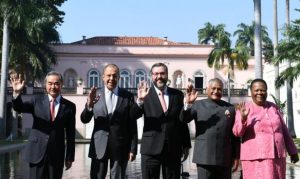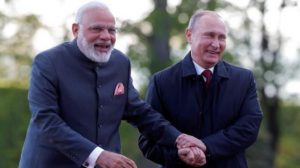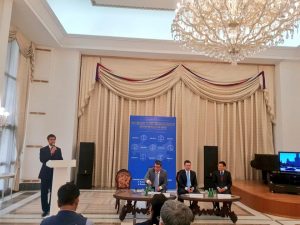
Ahead of Prime Minister Narendra Modi’s visit to Vladivostok, Russia has underlined that unilateral sanctions by the US can’t impact “time-tested” relations with India, indicating that it is confident of the S-400 deal going through in the face of threats by Washington.
“Russia-India relations are time-tested and it cannot he stopped by sanctions…,” Roman Babushkin, Deputy Chief of Mission, Embassy of Russia, told journalists in New Delhi.

In a special gesture, Russia’s President Vladimir Putin has invited PM Modi as the guest of honour at the Eastern Economic Forum, which will be held in Vladivostok, Russia, September 4-6 September. The two leaders are also expected to hold their annual summit meeting on the margins of the summit.
Taking a strong stand against years of punitive US sanctions, Mr Babushkin said: “Unilateral sanctions are against the global rules-based order…Unilateral sanctions are creating huge impediments not just for Russia, but those who do business with Russia.” The US and Western countries imposed sanctions in Russia in 2014 in the wake of the Russian military intervention in Ukraine. The unilateral sanctions have adversely impacted the Russian economy.
The Russian diplomat’s remarks opposing unilateral sanctions suggest that Moscow is determined to go ahead with the deal to sell the Russian S-400 Triumf air defence system to India, which is being targeted by Washington through the Countering American Adversaries Through Sanctions Act (CAATSA). India has been pressing the US to exempt the S-400 deal from the proposed CAATSA sanctions.
Foreign Ministers’ Meeting in Rio
Issues regarding sanctions also figured in the discussions between the foreign ministers of five BRICS countries, including Brazil, Russia, India, China and South Africa, in Rio de Janeiro on July 26. The meeting culminated in a joint statement that underlined the support for multilateralism and the need to avoid coercive measures that are inconsistent with the charter of the UN. “The Ministers reaffirmed their commitment to international peace and security and underlined the imperative of countering challenges through political and diplomatic means and the need, in this regard, to avoid all measures, especially coercive measures, that are inconsistent with the Charter of the United Nations,” said the joint BRICS statement issued in Rio de Janeiro. “They underlined support for multilateralism and the central role of the UN in international affairs, and the commitment to uphold the purposes and principles enshrined in the Charter of the United Nations.”
5G solidarity

In New Delhi, senior diplomats from Russia, China and Brazil took a united stand on issues regarding 5G networks and data storage on July 25. “Regarding the [policy] of the United States of America with regard to certain Chinese companies, we deem it an inappropriate way of dealing with competition,” said Mr Babushkin.
“We will be discussing 5G,” said Brazil’s Deputy Chief of Mission in Delhi Brenna Herman. He added that BRICS countries will “coordinate positions,” but clarified that BRICS is not a mechanism against any particular country or grouping.
Author Profile

- Manish Chand is Founder and Editor-in-Chief of India Writes Network (www.indiawrites.org) and India and World, a pioneering magazine focused on international affairs. He is CEO, Centre for Global India Insights, an India-based think tank focused on global affairs.
Latest entries
 India and the WorldFebruary 27, 2026Modi visit: India-Israel partnership enters a new era
India and the WorldFebruary 27, 2026Modi visit: India-Israel partnership enters a new era India and the WorldFebruary 24, 2026Unravelling Modi’s Israel journey: What to expect
India and the WorldFebruary 24, 2026Unravelling Modi’s Israel journey: What to expect India and the WorldFebruary 17, 2026South-by-South: Focus on people-centric solutions at India AI summit
India and the WorldFebruary 17, 2026South-by-South: Focus on people-centric solutions at India AI summit India and the WorldFebruary 7, 2026Modi hails interim India-US trade deal, Goyal says no concessions made on agriculture
India and the WorldFebruary 7, 2026Modi hails interim India-US trade deal, Goyal says no concessions made on agriculture







